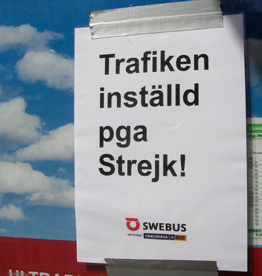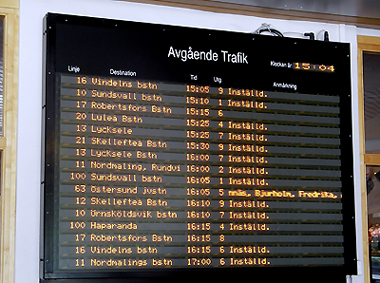Bus Strike Spreads to Västerbotten Posted by Transparent Language on Jul 11, 2008 in Culture
 Yesterday I wanted to see how the bus drivers strike looked like in Västerbotten, which is a province in Norrland where I live. So I borrowed a friend’s car (no buses running, duh!) and drove downtown. Why did I have to borrow a car if my own was sitting safely in its assigned space in the parking garage? It has a brake problem, which needs to be fixed, but since this is July in Sweden, my friendly mechanic is on vacation. And the parts supplier is also on vacation. And the guy the supplier orders parts from is also on vacation and no new orders can be placed until he returns. So the car sits in the garage until the end of August when the life as we know it will resume once again.
Yesterday I wanted to see how the bus drivers strike looked like in Västerbotten, which is a province in Norrland where I live. So I borrowed a friend’s car (no buses running, duh!) and drove downtown. Why did I have to borrow a car if my own was sitting safely in its assigned space in the parking garage? It has a brake problem, which needs to be fixed, but since this is July in Sweden, my friendly mechanic is on vacation. And the parts supplier is also on vacation. And the guy the supplier orders parts from is also on vacation and no new orders can be placed until he returns. So the car sits in the garage until the end of August when the life as we know it will resume once again.
The bus strike in Västerbotten started at midnight on Wednesday, and yesterday was the first day without service. One of the two bus companies affected – Veolia (the other one is Swebus) announced they would lock-out their 67 drivers (which means those guys will not get paid for the duration of the strike), and the Kommunal union responded with “we plan to strike for as long as necessary to get our contract demands.”
And these demands are: a wage increase of 1,600 kronor per month spread out over two years, as well as the right to at least 11 hours rest between shifts.
Sounds reasonable to me, but then again, I am not a bus driver.
For the masses at large the strike means that there is no transport in Umeå, there is no transport in other towns in Västerbotten, and no transport between those towns, either. And anyone who’s ever spent half a day in the north can imagine just how sad life without buses can be here.
It’s a curious strike, too. I remember witnessing quite a few work stoppages in France, where the striking workers took to the streets waving signs and making their demands known to everybody who wanted to listen. There were picket lines with men and women dressed in bright colors chanting slogans, eating baguette sandwiches and posing for the cameras. The French truly know how to strike.
It’s different here. I went to the bus station to see if there was anything going on. Apart from a drunk trying to break into the toilet without paying the 5 kroner fee (yes, we pay for public toilets here) the place was deserted. There were a few customers in the adjacent fast food joint, but that was all. I started taking photos of the bus schedule display showing all services except one (that one is run by a different private company) as “cancelled” when suddenly a security man appeared wanting to know what my business was. I told him I came to see the strike. He said there was nothing to see. And he was right. I wanted to know where the striking bus drivers were, but he didn’t know and suggested that I visit the union offices nearby.
The Kommunal offices in Umeå are practically next door to the bus station. They were equally empty and apart form a few buzzing flies, devoid of any signs of life. There was nobody who could answer my questions. A woman working in a nearby office just shrugged her shoulders and said they were probably all out, because it’s July and the weather was nice. Actually, she was right. The weather was nice – for Västerbotten.
So for now the mystery of just where the striking bus drivers went remains unsolved. I’ll be looking into it as the strike continues.
Useful words for today:
Let’s take a look at the strike notice in the photo. It says:
- Trafiken inställd pga strejk
Now let’s break it down to separate words:
- trafik (noun, def. trafiken) – traffic (alla människor och fordon som rör sig på en väg), or bus service in our example.
You can also see that trafik is one of those uncountable nouns that don’t have plural forms, which we discussed in an earlier post.
- inställd – cancelled, stopped as in “be cancelled”
It’s a form of the verb inställa and it means “stoppa något som man har planerat, eller sluta med något”.
- p.g.a. – it’s an abbreviation of “på grund av” – due to something, which happens to be a bus strike in our example.
- strejk (noun, def. strejken, plural – strejker) – and yes, it means “a strike”, as in – work stoppage due to a union action. As you can see, the word migrated from English, but sounds a little bit different (e instead of i) and has a different spelling. But I’m sure you could guess what it meant anyway.
And so the strike continues. Next week it’s scheduled to spread to Skåne and to airport shuttle services. This will not be fun.

Build vocabulary, practice pronunciation, and more with Transparent Language Online. Available anytime, anywhere, on any device.





Comments:
nick:
Hullo,
another question related to travel… one of the problems with learning Swedish is that air flights into Sweden are so expensive. I once booked a flight to Sweden and bizarrely, it was cheaper to fly from London to Paris and then get on another plane from Paris to Stockholm than fly direct via SAS. But even this double-flight was dear.. are there ary cheaper methods of getting there? When I looked into this last, the only budget ferry crossings were for quick stopovers where you get to do 4 hours shopping and have to come back 🙂
Any advice in this respect appreciated; I want to take my young chilren over one winter to see some snow (we now rarely get snow in southern England with global warming 🙁 ) so finding cheap travel is essential 🙂
thanks 🙂
Oh p.s. on the subject of en or ett dictionaries – well done for pointing this out, this has been a constant source of frustration for me, however I do know of one bilingual dictionary, albeit small, which has all the genders, and that is the ‘Berlitz’ travel dictionary (the little pocket-sized ones.)
regards.
Anna:
Hi Nick,
regarding travel, here is some info you might find useful:
http://www.europealacarte.co.uk/blog/2008/06/30/low-cost-flights-with-ryanair-and-sterling-to-sweden/
and here’s a piece about discounts for train travel within Sweden:
http://www.europealacarte.co.uk/blog/2008/07/07/train-discounts-in-sweden/
About that Berlitz dictionary, yes, I know about it, but I find it rather deficient for serious (or anything more than survival Swedish) language study. It’s a good first step, but if you keep learning Swedish, you tend to outgrow it very quickly.
ceci:
hej tell me…i am moving to lycksele next year, i am from argentina…are you living by there? ceci
Pete Flawn:
Hi, I enjoy your blog and the information it provides. I have three grandsons living in Sweden so I am able to learn a bit about their background. It would be interesting to learn something of the educational system etc. Good luck in the games. Pete Flawn
Pete Flawn:
Hi I would like to say how much I enjoy your blog. I have three grandsons living in Sweden so it gives me some idea of their background. It would be interesting to learn something of the educational system. Good luck in the games. Pete Flawn
Anna:
Hi Pete!
I’m putting it on my schedule! A post about the educational system will be coming up – just for you! But I’m sure others will be interested in it as well. Actually, it will be a fun topic, I think. Thank you for suggesting it! 🙂